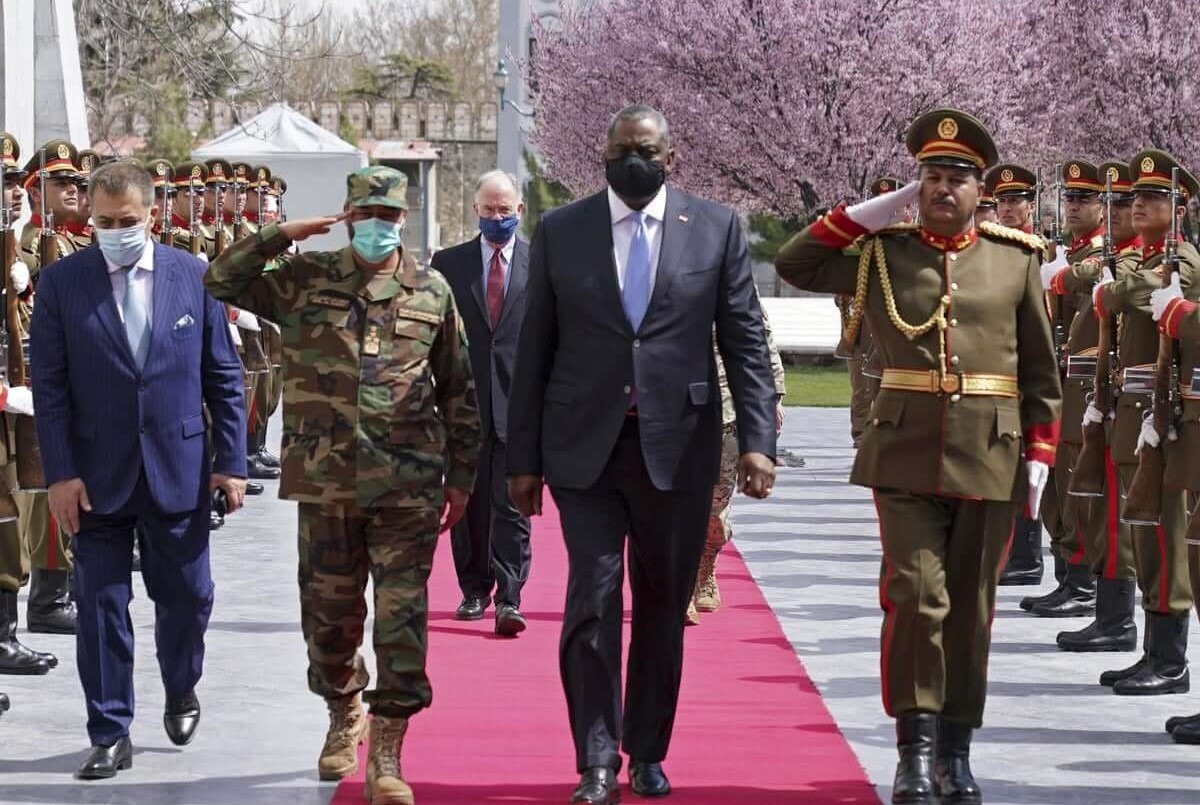
US Defense Secretary Lloyd Austin Visits Afghanistan as Exit Deadline Looms
Lloyd Austin, the US secretary of defense, made a surprise visit to Afghanistan, meeting President Ashraf Ghani in Kabul.
In Washington, a senior Senate Democrat called for Joe Biden to bring US troops home. The current deadline to do so, 1 May, was agreed between the Trump administration and the Taliban last year.
“We ought to consider a debate under the constitution for authorisation of the use of military force,” Dick Durbin said.
Biden said in an interview last week that it would be “tough” for the US to meet the deadline. But he also said that if the deadline is extended, it will not be by a “lot longer”.
Austin made his unannounced visit after a trip to India and at a crucial time for the Afghan peace process, as the Biden administration reviews its policy.
In a statement, the Afghan presidential palace said Austin and Ghani discussed the peace process and rising violence. The Taliban and the Afghan government have blamed each other, and the Islamic State, for a wave of bombings and assassinations.
Earlier this month, the Afghan minister of state for peace, Sayed Sadat Mansoor Naderi, said he believed “the US will leave responsibly”.
“Like most government officials,” “he is palpably relieved that the Biden team is taking a hard look at a [Trump-Taliban] deal which shut out the government of President Ghani, whom the Taliban dismiss as American puppets or ‘the Kabul administration’.”
In a letter to Ghani earlier this month, US secretary of state Antony Blinken said it was urgent to make peace and all options remained on the table. He also warned that it was likely the Taliban would make swift territorial gains if US and Nato troops withdrew. The US spends $4bn a year to sustain Afghanistan’s forces.
At a press conference in Moscow, the day after meeting Afghan negotiators and international observers to try to jumpstart the stalled peace process, the Taliban warned the US against defying the 1 May deadline.
Washington has given the Taliban and the Afghan government an eight-page peace proposal, which both sides are reviewing. It calls for an interim “peace government” which would shepherd Afghanistan toward constitutional reform and elections. Ghani has resisted an interim administration. He says elections alone are acceptable to bring a change of government.
Both the US and Kabul have called for a reduction in violence leading to a ceasefire. The Taliban say a ceasefire would be part of peace negotiations. However, the insurgent movement has not attacked US or Nato troops since signing the agreement.
Among the small group of US media travelling with Austin, the defense secretary said on Sunday the US wants “a responsible end to this conflict” and “a transition to something else”.
US and allied troops invaded Afghanistan in October 2001, shortly after the 9/11 attacks on New York and Washington. At its height the US troop presence was around 100,000. It was reported this week that there are actually 3,500 US troops still in the country, rather than the 2,500 the US military had reported.
According to Pentagon statistics, more than 2,300 US troops have died in Afghanistan. Ten died in 2020.
Durbin, from Illinois and the No2 Democrat in the Senate, called for the administration to end America’s longest war.
“Twenty years ago or so, I voted against the invasion of Iraq but voted for the action that we took against Afghanistan,” he said.
“They said, ‘That’s where the people are, that’s where the folks who are responsible for 9/11 are hanging out,’ and I said, ‘Let’s go. Nobody should be allowed to kill 3,000 Americans, innocent Americans, and get away with it.’
“I had no idea at that time that I was voting for the longest war in the history of the United States. It is time for it to come to an end. We ought to consider a debate under the constitution for authorisation of the use of military force, as it relates to Afghanistan.
“At this point I see no end in sight for our presence there. I want to make sure there is a safe exit of our troops. We try to keep the environment as stable as possible [but] as far as engaging in Afghanistan war for another decade, I’m opposed.”

